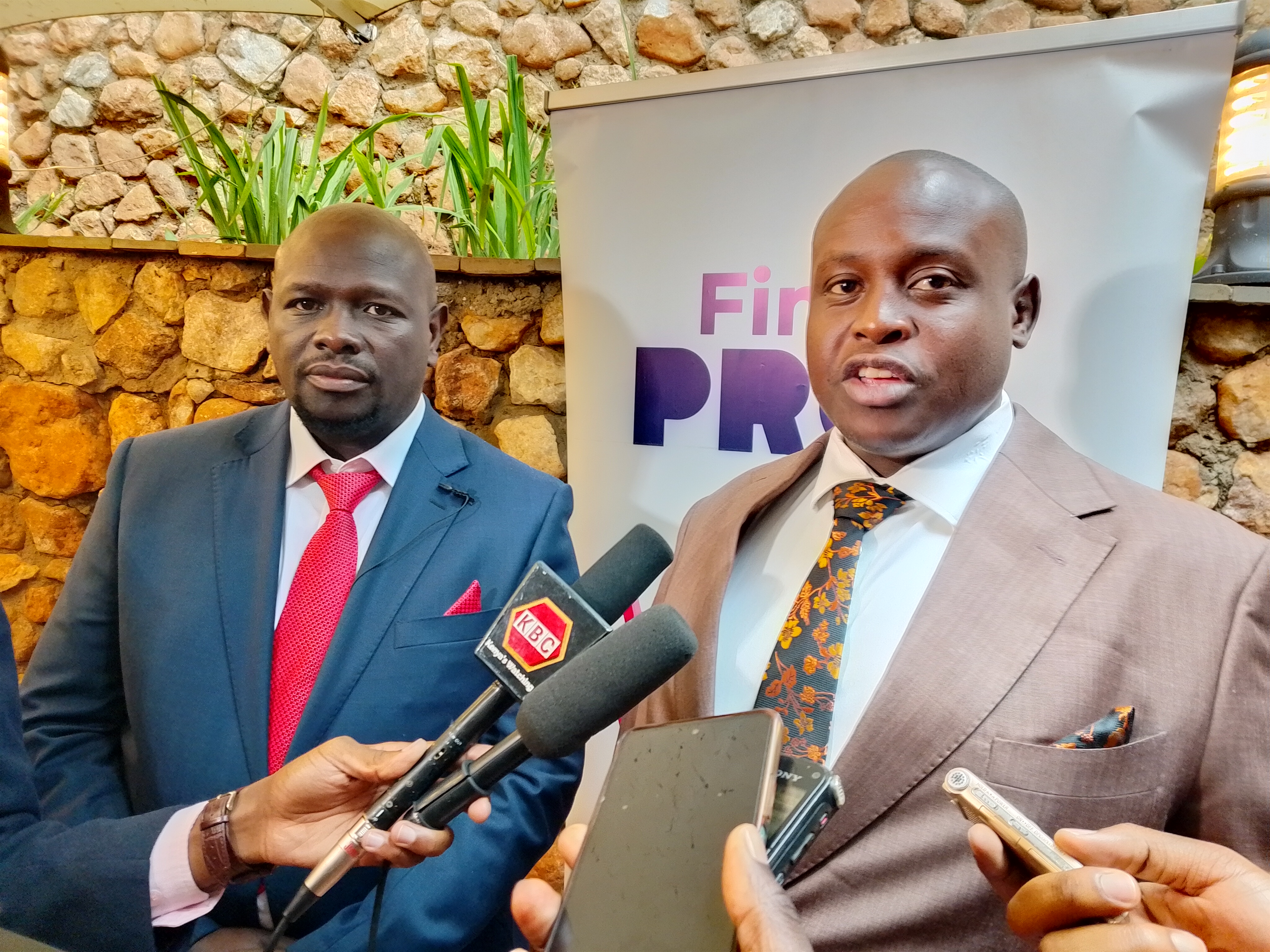 Proto Energy CEO Joel Kamau and Energy and Petroleum Regulatory Authority director general Daniel Kiptoo during the company’s sustainability report launch/ MARTIN MWITA
Proto Energy CEO Joel Kamau and Energy and Petroleum Regulatory Authority director general Daniel Kiptoo during the company’s sustainability report launch/ MARTIN MWITAThe government targets to set maximum cooking gas prices anytime from October, Energy and Petroleum Regulatory Authority (EPRA) now says.
Director General Daniel Kiptoo on Wednesday said they have already put in place the legal and regulatory framework, and are currently engaging stakeholders on the Open Tender System (OTS) for bulk imports.
Alternatively, the government could pursue a government-to-government deal similar to the one used on importing other petroleum products.
Other products being considered for a centrally coordinated bulk procurement system are Heavy Fuel Oil and bitumen.
Heavy Fuel Oil is a tar-like residual fuel from crude oil distillation, often used as marine fuel, while bitumen is primarily used in road construction and waterproofing.
The move follows a Cabinet approval on December 17 last year, for procurement of the three products through a coordinated system, with EPRA tasked with formulating operating procedures that are backed by law.
According to EPRA, OTS will allow competitive bidding, with the lowest bidders awarded the contracts to ship products for sale to wholesalers and on-wards to retailers
It plans to have a centralised importation and common user facilities to drive affordable imports, with EPRA moving to set maximum prices.
“The framework is already in place, the OTS agreement is ready, it has been negotiated with the industry, so we are now just looking at a transition plan. You know, we have to get OMCs (Oil Marketing Companies) to sign up on the Open Tender System Agreement,” Kiptoo said.
“We also announced to start engaging with suppliers, take a decision as to running the first OTS, but also recognise there have been inputs coming in privately, so we have to work on a proper transition plan. In terms of timelines, we are looking to ensure that we roll this out before the end of the year.”
He spoke during the Proto Energy Limited launch of its 2025 Sustainability Report, which shows the company's significant achievements and future commitments in environmental, social, and governance (ESG) practices.
Proto Energy CEO Joel Kamau said the industry is keen to partner with the government on sustainable and affordable energy solutions.
“The penetration of LPG is very high in Nairobi, actually, around 45 per cent but when you look at it in the rural market, it is only five per cent, meaning the opportunity, as the DG has said, we have a huge opportunity in Kenya to make sure that we have clean energy in our homes,” Kamau said.
Proto is also backing the government’s crackdown on illegal refilling in the country where Energy Cabinet Secretary Opiyo Wandayi directed the EPRA, in collaboration with state security agencies, to crackdown on illegal LPG dealers and ensure they are prosecuted.
Licensed players who flaunt the law will also have their permits revoked under the new directive, which seeks to enhance safety in the industry and safeguard lives, amid driving health and economic benefits in the LPG space.
“Every of the 4.7 million cylinders that Proto Energy has in the market, all of them have a barcode, and the barcode has a scanner in it. So we actually can tell. So ours is to integrate it as a whole country with the rest, so that then we can track,” Kamau said.
He said the firm also supports the planned LPG cylinder distribution to low-income households by government, targeted at 4.5 million units.
The government, through the National Oil Corporation of Kenya, plans to distribute 1.3 million cylinders, while the private sector distributes 3.1 million cylinders through their established distribution networks.
“We are partners with the government to ensure that those policies and initiatives come to life in the country,” he said.
The government seeks to lower the cost of LPG by ending the monopoly in the industry, with cheaper products expected to increase the use of clean energy by households, where it targets to increase annual uptake from 7kgs per capita to 15kgs.
Consumption last year was at about 414,861 metric tonnes up from 360,594 metric tonnes in 2023.
The government also targets to enhance penetration from the current 24 per cent to 70 per cent by 2028, with an ongoing programme to move schools from firewood to LPG use expected to drive demand.






![[PHOTOS] Gachagua condoles with Lempurkel’s family](/_next/image?url=https%3A%2F%2Fcdn.radioafrica.digital%2Fimage%2F2025%2F09%2F5606c8f3-166a-4e21-85a4-851132990270.jpg&w=3840&q=100)





